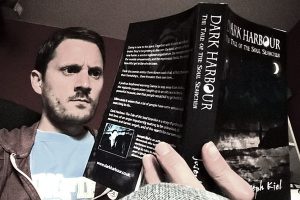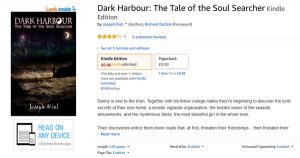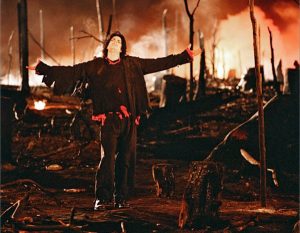It’s been almost 18 months since I self-published my first novel on Amazon and so I thought I would write a blog on the experience of dipping my toes into the great publishing ocean, and hopefully give some help and pointers for other authors, especially unpublished writers who are thinking of releasing their first works. Not that this is advice from a bestselling author or anything – whilst I’m no longer a first-time author, I still consider myself a newbie in this realm and so I’m still very much learning about it all, still trying to find that magical formula myself… if indeed there is one. There are various eBooks out there that appear to have the winning formula to turn you into a bestseller; you’ll read them and they’ll get you inspired but you probably still won’t get anywhere. Read them anyway. They’ll give you pointers if nothing else. Anyway, take anything I write here for what it is and feel free to disagree and add to the discussion!
I should point out that all of the following is from what I’ve found through publishing with Amazon only. I know there are other eBook vendors out there but I have no experience with them. I have heard from other authors that most of their sales come through Amazon. The reason I am with Amazon solely is because my books are signed up to KDP Select which asks for exclusivity.
So what I thought I would do was present my findings in a list:
The top 10 things I’ve discovered through self-publishing.
1. Don’t proofread your work yourself.

“Ah crap, I found ANOTHER typo!”
Well, I mean, let that be the starting point – you need to at least start the work of tidying up those inevitable typos and grammatical errors and those clunky sentences or things that are otherwise just plain wrong, but you need other eyes to look at your work. Preferably you need someone with a keen eye for detail who will scrutinise each sentence meticulously – having proofread other authors’ works myself I have a pretty good sense of what’s involved in the job. No matter how many times you proofread your own manuscripts, something will get through. Saying all that, I proofread both of my Dark Harbour novels myself – and in fact no one else on the planet had even read the whole of the first one before I published it. The good thing is that with eBooks you can correct any mistakes and re-upload them pretty quickly, which is what I did.
A year later I reviewed the manuscript of The Tale of the Soul Searcher with fresh eyes, and I found that despite having read through it countless times in the past, I still found typos that I’d missed. But despite all I’ve said here, I’ll most probably continue to ignore my own advice and carry on publishing without another proofreader going over my work. But you shouldn’t do this. Get a proofreader. Better still, get an editor.
2. Most of your readers will come from America.

You’ll know you’ve made it if Rory Gilmore buys your book
It’s a no-brainer really: the population of the USA is 5 times bigger than the UK so it’s a bigger market. Now, as you’ll no doubt have gathered by now, I write in English, and so my markets are mainly the English-speaking world, and if you haven’t gathered from my spellings or my domain name, I’m based in the UK. I don’t know, but I have a suspicion that the number of kindle/eBook readers is proportionally higher in the US than the UK – perhaps there’s data out there to confirm that. But anyway, you’re going to get a lot of US readers. Yes, I’ve had a bit of response from the Australian and Canadian marketplaces, and even a small trickle from non-English-speaking marketplaces, but most of your readers will be American, and to further give you an idea on demographics, I’m pretty sure most of my readers are female.
 3. My native UK market seems to ‘get me’.
3. My native UK market seems to ‘get me’.
This is based on the reviews I’ve got through the US and UK Amazons: the US has given me a complete mixed bag, whereas the UK was unanimously giving me 5 stars until someone thought The Tale of the Soul Searcher was the sickest thing they’d ever read and bucked the trend with a 1 star (would have been a 0 if Amazon allowed, apparently). So I don’t know whether other writers find this, that their books are best received in their native countries, but that’s been the case with me.
4. You’ll most probably sell way more eBooks than hard copies, but you should still have both versions available.

And we need fewer trees, right?
I say this even though publishing paperbacks is a more complex process – you need a back cover and spine in addition to the front cover for one thing, and this is all proportional to the size of your manuscript of course, so there’s a lot of precision involved and Amazon will reject your document if it doesn’t fit the template. I did find that Amazon takes you through the process well though, and they’ve made it much more straightforward since they ditched Createspace and you can publish your paperback version through the same control panel as your eBooks. But your main market will most probably be the eReaders. It’s nice to have hard copies – it helps for marketing, you can give them away, and I guess they somehow make you feel like a ‘proper’ author, having something physical that you can put on your bookshelf.

Now this guy?… He’s kind of a big deal.
5. Marketing yourself and promoting your work can be a full time job.
When you have more than one other life like I do, this can make it challenging to find some degree of success in this field as you need to spend so much time at it. I mean, look at my blog here. It’s not exactly brimming. You can learn a lot from other authors, so see what they’re doing, talk to them. There’s a useful forum you should join called KBoards, full of authors discussing self-publishing and their experiences of promoting themselves, so get signed up there.
I pestered a lot of other authors for their insights, and still do! Learn from their mistakes as well. See what you don’t like about them. There’s a ton of writers on twitter and a lot of them seem to market using the same cookie-cutter way where everything is a brand. Hey, maybe it works and I’m just getting it all wrong, but I’m conscious of presenting myself as a ‘real person’ and not overselling. That’s probably my biggest turn off with other authors. I don’t like automated DMs on twitter when I follow people and I rarely read them, so I don’t use them myself. Recently, as another example, I was enticed to sign up for an author’s newsletter and to download one of his books for free, but this then sent me on a series of hoops to jump through and I was very soon exhausted and unsubscribed from his mailing list. I would imagine the guy is doing way better than me, but still, it didn’t work for me.
Anyway, that’s the end of part 1. Stay tuned next week for the concluding episode!

Pingback: The Findings of a First-Time Author (Part 2) • Dark Harbour